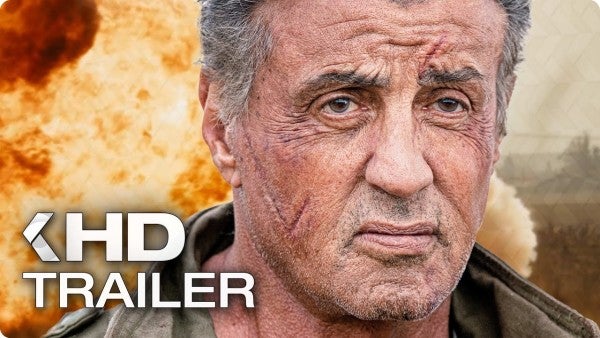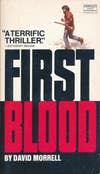‘I would be happy to have it stop’ — the creator of Rambo wants ‘Last Blood’ to actually be the last in the series
A little past the middle of a recent screening of Rambo: Last Blood, after Rambo casually dropped a severed head from his pickup truck window, author David Morrell shook his head and laughed to himself — but not because he found it funny.

A little past the middle of a recent screening of Rambo: Last Blood, after Rambo casually dropped a severed head from his pickup truck window, author David Morrell shook his head and laughed to himself — but not because he found it funny.
“In my novel, Rambo is a man bitter about what he learned about himself in war,” says the Santa Fe writer of the iconic character he created in 1972's First Blood. “That's not dramatized at all in the new movie. Anyone 40 years or younger won't have the faintest idea what's troubling him.”
The man on the screen, he says, isn't his Rambo, a disenfranchised, angry Vietnam War vet coming to terms with the killing he did for a nation he no longer understood — and which no longer understood him.
Fast forward through three sequels, and Rambo (73-year-old Sylvester Stallone) is training horses in Arizona when a Mexican crime cartel kidnaps his niece. Rambo crosses the border to get her back, and then members of the cartel come looking for him. Carnage ensues — and it's a brutal, ugly ride. Characters are raped, drugged, beat up, slashed, shot, and bombed to death. One character has his heart cut out onscreen while he's still breathing.
Though Rambo experiences a flashback or two that hint at trauma in Vietnam, Last Blood's Rambo is so removed from David Morrell's creation that he may just as well have been called John Smith, Morrell says.
“My feeling about the character is that he usually reflects something happening in the culture of the time. If this film is a representation of what's going on in our country, we're doomed.”
The war comes home

A cover of the 1972 novel 'First Blood' by David Morrell
Morrell was a graduate student at Penn State University when TV and newspapers were dominated by reports about Vietnam combat soldiers in action and armed National Guardsmen posted in cities rocked by riots and civil-rights protests.
It was as if the war had come to America, he says.
And then he wondered, what if the struggle was embodied by a Vietnam vet — battle-scarred, angry, and missing any purpose — roaming the country he once served? Morrell thought of Audie Murphy, the most decorated soldier of World War II and a film actor who fought the war over and over every time he shot down a stuntman dressed as a bad guy or Indian warrior. Murphy slept with a pistol under his pillow, and in the middle of the night, he sometimes blasted away at German soldiers who attacked him in his nightmares. All he knew was killing, and suddenly he was playing at it in B-Westerns.
“I was fascinated by Audie Murphy ever since I was a kid,” says Morrell, 76, who was born in Canada but immigrated to the United States in the 1960s. “He was a human killing machine. I wondered what he might have done had he come home from 'Nam and let his hair grow long and wandered the back roads of the country.”
The result was First Blood, Morrell's debut novel, which was published to mostly good reviews. In it, Rambo (he has no first name in Morrell's novel), is viewed by small-town locals as a member of the counterculture because he doesn't cut his hair, doesn't take a bath, and doesn't have a job. After a middle-aged police officer locks Rambo up, things go badly. Soon, he uses his combat-honed skills to do away with police officers, civilians, and posse members in the backwoods of Kentucky as they first pursue him and then become the pursued.
Not long after it was published, Hollywood wanted the film rights, and Morrell watched with bemusement as various directors (Richard Brooks, Stanley Kramer, and Martin Ritt, for example) and movie stars (such as Steve McQueen, Robert Blake, and Paul Newman) were attached and unattached to the project. When the film finally went into production in 1981, Stallone, who had catapulted from wannabe screenwriter and actor to mega-stardom in the 1976 hit Rocky, took on the role of Rambo. The resulting screenplay, which Stallone had a hand in, eliminated the killing. Now, Rambo simply wounded a lot of people, so that he could survive and possibly find a way to live with his actions at the end of the film.
In the novel, Rambo dies. When Morrell's lawyer made the film deal for the book, he told Morrell he acquired royalty rights to any sequels made. “How can there be a sequel?” Morrell says. “Almost everyone in it is dead.” His lawyer pragmatically replied, “David, this is Hollywood. When this comes out, it could end up as a musical comedy set on a submarine.”
Reinventing Rambo

Sylvester Stallone as John Rambo
First Blood, which Morrell said cost about $15 million to make (and grossed more than $47 million in this country alone) was one of 1982's biggest hits. Two sequels followed. In the first, Rambo: First Blood Part II (1985), government officials release Rambo from prison so he can return to Vietnam to find any American POWs left behind.
“Do we get to win this time?” Rambo asks his commanding officer as he goes off to kill pirates, meddling Soviets, Vietnamese soldiers, and anyone else who gets in the way of his mission.
Domestic grosses in excess of $150 million led to Rambo III (1988), in which Rambo heads to war-torn Afghanistan to rescue his former commander and play a role in the Soviet-Afghan War. A master of any kind of destructive weapon, he once again kills a lot of people and survives, proving along the way that American military might will overcome just about anything if political leaders let soldiers do their jobs.
As the series progressed, Morrell could see that Rambo was progressing from a combat-stressed soldier wired to kill to a human superhero. But, he says, important aspects of the original character remained. “In each film, he was determined to repress what he learned about himself in combat. The consistent plot pattern was that he resisted until something deeply personal forced him to access that part of himself, releasing a justified rage. What he hates about himself became the only way he could defend what he loved.”
Although that dynamic is echoed in Last Blood, Morrell says Rambo's reluctance to kill and the combat stress that still haunts him has been lost.
Though Morrell wasn't asked to weigh in on scripts for any of the films, not even the first, he did visit Stallone on the set of the third film and developed a friendship with the man who had virtually remade Rambo into a live-action figure. The two men realized they had somehow created a cultural phenomenon known as Rambo. A cartoon, video games, and novelizations (penned by Morrell) of the second and third films added to the craze. There are quite a few Jeopardy! questions that refer to Rambo, too.
Even so, Rambo hasn't made Morrell a millionaire. Although Morrell retained royalties for sequels, “that's a far cry from box office receipts. Movie profits are like the horizon. They recede infinitely.”
Morrell likes Stallone. “He's excellent in the role,” he says after re-watching the original 1982 movie. “I've had a good relationship with him.” When Morrell's son Matthew was battling a rare form of bone cancer that eventually took his life at age 15, Stallone called the boy and talked movies with him for about 10 minutes — a gesture Morrell will not forget. By then, the late 1980s, Morrell had quit his job teaching English at the University of Iowa to write full-time. He has since turned out a number of well-received fiction books, including a popular trilogy (the “Thomas and Emily De Quincey” series) set in Victorian England. In it, essayist and critic Thomas De Quincey plays a prominent role in investigating a series of grisly crimes that seem to be based on one of his works.
Letting go
Stallone wasn't done with Rambo. In 2008, he wrote and directed the fourth film, Rambo, with our hero now transplanted to Thailand, where he gets involved with an effort to save some missionaries and civilians kidnapped by soldiers. In the last shot of that film, Rambo returns home to a ranch somewhere in the Southwest, suggesting he might find peace.
Over the years Stallone and Morrell talked about teaming up to make one last Rambo film together, one that would bring out the humanitarian side of the character and allow him to finally come to terms with the choices he made in his life. Although the two talked by phone and email for years about a “soulful” rendition of Rambo, the correspondence petered out by 2016. Morrell says he had nothing to do with the current film and that neither Stallone or the film's producers ever reached out to him for comment or even to give him an update.
After seeing the new movie (which as of press time had seen nearly $19 million in U.S. ticket sales), he says he's glad they left him out of it. “If the series were to continue this way, I would be happy to have it stop.”
Still, Morrell isn't bothered by being tied to Rambo — even when it's mentioned to the exclusion of his other novels and stories. He constantly works on new projects, whether it's a Western he's writing or an essay on the late cowboy movie star Roy Rogers that's due to appear in Western Writers of America's Roundup magazine in December. He's an unapologetic fan of Rogers and director William Whitney (who helmed many of Rogers' post-war Westerns), as well as Quentin Tarantino.
Seeing Rambo riding and training horses in the first few minutes of Rambo: Last Blood gave Morrell hope. “I saw his story as a Western about a roving gunfighter who wanted to hang up his guns and the local law wouldn't let him,” he says. But coming out of the movie, Morrell says he felt degraded and dehumanized.
“Inevitably, I'm identified with the character of Rambo. Which is why I'm so possessive of him and annoyed at the direction he's taken. I'm like the parent of a child who has grown up and has his own life beyond me now.”
———
©2019 The Santa Fe New Mexican (Santa Fe, N.M.). Distributed by Tribune Content Agency, LLC.